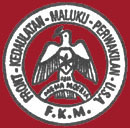| Maluku Sovereignty Front | |
|---|---|
| Front Kedaulatan Maluku | |
 Emblem of Maluku Sovereignty Front Representative in the US | |
| Also known as | Front for the Sovereignty of the Moluccas |
| Leader | Alex Manuputty |
| Active regions | Maluku Islands |
| Ideology | Moluccan nationalism Liberal conservatism Anti-communism |
The Maluku Sovereignty Front (Indonesian : Front Kedaulatan Maluku, FKM) is a secessionist movement on Ambon Island, aiming to restore the Republic of the South Moluccas (RMS). [1] It was established on 15 June 2000 at Ambon. [2]
Contents
They have been monitored by the Indonesian military for stockpiling weapons and other activities. Indonesian sources claim that the group first emerged in January 1999.[ citation needed ]
One of their activities has been to fly the banned flag of the Republic of South Maluku in public places to commemorate an unsuccessful secession attempt in 1950. [3]
The leader of the FKM organisation Alex Manuputty has fled to the United States, but continues to support independence. [4]